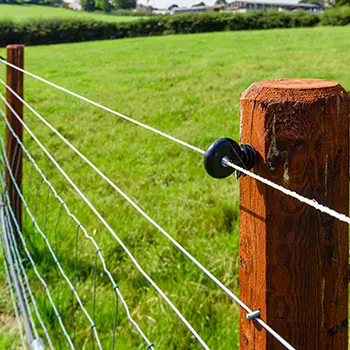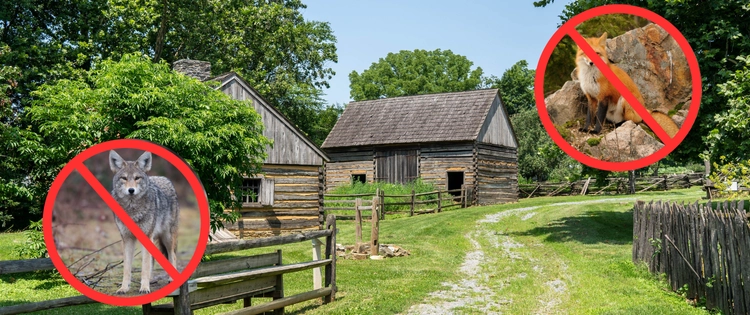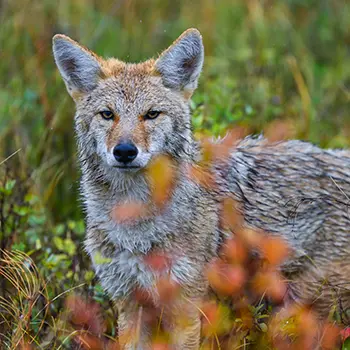Imagine waking up one morning to discover unsettling paw prints near your doorstep or witnessing a frightening encounter between your beloved pet and a wild animal.
These scenarios can be a harsh reality for some of us living in areas with potential predator activity. However, you don’t have to live in constant fear or take extreme measures.
Here are simple yet effective strategies to deter predators from your property and keep your furry friends safe.
Secure Your Property Line
One of the most effective ways to deter predators is by creating a physical barrier around your property. Here are some options to consider:
- Fencing: Install a sturdy fence made of materials like a chain link, wood, or vinyl, with the bottom portion buried underground to prevent digging underneath.
- Electric Fences: For added protection, consider an electric fence designed specifically for predator control. These deliver a safe but startling shock to deter animals from crossing the boundary.
- Roller Tops: Adding a roller top to your fence can make it more difficult for predators to gain a foothold and climb over.
Whichever fencing option you choose, ensure it’s tall enough (at least 6 feet) and well-maintained to effectively restrict entry.
Remove Attractants and Hiding Spots
Predators are often drawn to areas that provide easy access to food sources and shelter. To make your property less inviting, take the following steps:
- Store Pet Food Securely: Keep pet food and water bowls indoors, especially at night, to avoid attracting scavenging predators.
- Manage Garbage Properly: Use sturdy, lidded garbage cans and keep them in a secure area until collection day.
- Clean Up Fallen Fruit: Fallen fruit from trees can be a tempting snack for predators. Regularly clear any dropped fruit from your yard.
- Trim Landscaping: Overgrown bushes, tall grass, and dense vegetation can provide ideal hiding spots and den sites for predators. Keep your landscaping well-trimmed and maintained.
- Use Repellents: Certain smells, like ammonia or vinegar, can act as natural repellents when sprayed around the perimeter of your property.
By eliminating potential food sources and denning areas, you’ll make your property less appealing to predators looking for an easy meal or a place to settle.
Use Lighting and Noise Deterrents
Predators tend to be more active at night and prefer to hunt or scavenge under the cover of darkness. Utilizing lighting and noise deterrents can help disrupt their activities and make them feel exposed, encouraging them to stay away.
- Motion-Sensor Lights: Install motion-sensor lights around your property’s perimeter. The sudden illumination can startle predators and make them feel more vulnerable.
- Ultrasonic Deterrent Devices: These devices emit high-frequency sounds that are undetectable to humans but can deter predators by mimicking the warning cries of larger predators.
- Radios or Speakers: Playing human voices or sounds from radios or speakers can create the impression of human activity, making predators wary of approaching.
Remember to vary the locations and types of deterrents used, as predators can become accustomed to consistent patterns or sounds over time.
Get a Guarding Animal
For properties with livestock or larger areas to protect, consider enlisting the help of a guarding animal.
These animals have a natural instinct to defend their territory and can serve as an effective deterrent against predators.
Animal | Description |
Livestock Guardian Dogs | Breeds like Great Pyrenees, Anatolian Shepherds, and Akbash Dogs are bred specifically to protect livestock from predators. They are vigilant, territorial, and will actively confront threats. |
Guarding Donkeys | Donkeys are known for their aggressive behavior towards canine predators like coyotes and dogs. Their loud brays and kicks can deter potential threats. |
Llamas and Alpacas | These camelids have a strong herding instinct and will band together to protect themselves and other livestock from predators. Their size and defensive behavior can discourage predators from approaching. |
When introducing a guarding animal to your property, proper training and socialization are crucial to ensure the safety of both the animal and your other pets or livestock.
Consider Deterring with Smells
Predators rely heavily on their sense of smell, and certain scents can act as natural deterrents. Here are some options to explore:
- Predator Urine or Lures: Products containing urine or glandular scents from larger predators like wolves or coyotes can trick smaller predators into thinking a more formidable threat is present.
- Human Hair or Soap: The scent of human hair or soap can signal human presence and potentially deter predators from entering the area.
- Ammonia-Soaked Rags: The pungent smell of ammonia can be unpleasant for predators and may encourage them to avoid the area.
Remember to rotate the placement of deterrent scents and replace them regularly, as predators can become accustomed to consistent smells over time.
Combine Multiple Deterrent Methods
While each of the methods mentioned above can be effective on its own, combining multiple deterrents is often the most successful approach.
Predators are intelligent and adaptable, so using a variety of techniques can make it more challenging for them to overcome or habituate to any single deterrent.
Here’s an example of a multi-layered deterrent strategy:
- Install a sturdy perimeter fence with a roller top or electric wire.
- Use motion-sensor lights and ultrasonic deterrent devices around vulnerable areas.
- Employ a guarding animal (dog, donkey, or llama) to patrol the property.
- Apply predator urine or lures around the perimeter and rotate their placement.
- Keep the property well-maintained by trimming vegetation and removing potential food sources.
Quick Note: Continuously monitor your property for signs of predator activity and adapt your strategy as needed.
Regularly maintaining and rotating your deterrent methods can help reinforce the message that your property is off-limits to these unwanted visitors.
Understanding Predator Behavior
Before implementing all the above, it’s crucial to understand what attracts predators to your property and identify the potential threats in your area.
What Attracts Predators to Your Property?
Predators are often lured by:
- Easy access to food sources: Pet food left outside, unsecured garbage cans, and fallen fruit can all serve as tempting meals for these opportunistic hunters.
- Potential prey: Pets, small livestock, or even your children playing outdoors can be perceived as prey by some predators.
- Comfortable denning areas: Overgrown bushes, brush piles, and crawl spaces under your home provide ideal shelter and nesting sites for predators.
Common Predators to Watch Out for
It’s essential to understand the predators you might encounter in your area. Here are some of the most common ones:
- Coyotes: These adaptable canines have expanded their range into urban and suburban areas, posing a threat to pets and small livestock.
- Foxes: While generally shy, foxes can prey on small pets and fowl if given the opportunity.
- Raccoons: Known for their mischievous nature, raccoons can ravage gardens, damage buildings, and even attack pets.
- Skunks: Though not typically aggressive, skunks can transmit diseases and dig up yards in search of food.
- Opossums: These scavenging marsupials may seem harmless, but they can carry diseases and bite if threatened.
Keep an eye out for signs of their presence, such as tracks, droppings, or disturbed areas, to identify potential predator activity on your property.
Protecting your property from predators requires a proactive approach and a combination of deterrent methods. Regularly monitor your property and adjust your strategy as needed. With the right precautions in place, you can keep your furry friends safe and discourage predators from making your property their new hunting ground.
Most Vicious Chicken Predators
Do You Make These Fatal Mistakes in a Crisis? (Video)
11 Must-Have Items for Your Wilderness Survival Shelter












